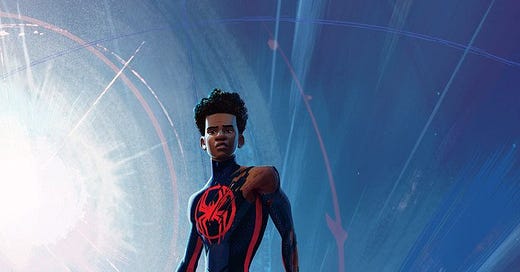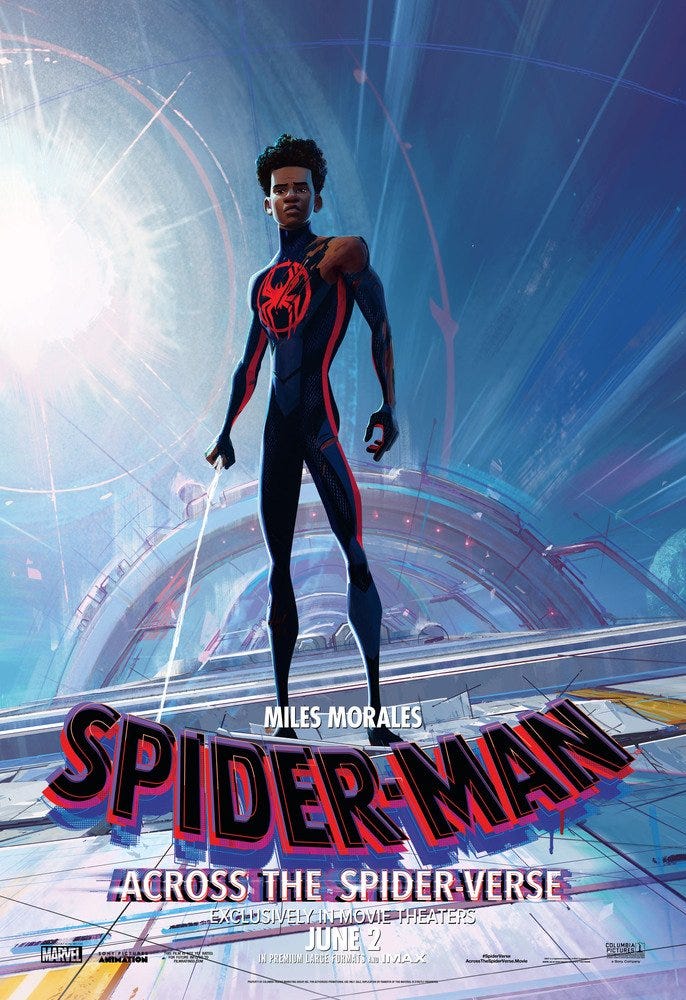Spider-Man: Across the Spider-Verse (Sony, PG-13)
Only a few movies have caused me to walk out of the theater with my jaw in my hands. And I don’t simply mean due to the sheer spectacle of it all. Beautiful movies, movies which require a theater viewing for the full experience, often are perfectly serviceable. What brought you to the theater is the spectacle. What I mean by “walking out with my jaw in my hands” pushes beyond the spectacle of a thing. When I stumbled out of the theater after Dune my brain raced, tracing imagery deep into parts of my subconsciousness I had tucked away since reading the Frank Herbert’s book in college. It was this rapturous experience, like being pulled from my body and slammed back in. All of my bones cracked and I felt a jolt of rejuvenation. When I shambled to the car with my group of friends after Blade Runner 2049, and as I lifelessly pushed TGI Friday’s potato skins into my still agape mouth, I distinctly remember my chest burning with inspiration. And anger. Because, inescapably, when I am witness to artists so clearly making their best work, and it resonates with me, there is a kind of frustration that bubbles up in my throat. It’s the kind of frustration you have when you are tapping away at a guitar, clumsily learning as you go, and your friend picks it up for a moment and plays something so beautiful and complex you feel like punching them. You don’t hate them, in any way. They are just so good you get…well a little mad at them.
Another of those films, burbling in the creative corners of my overactive brain, is Spider-Man: Into the Spider-Verse. I’ve never been a fan of folks spouting off at the mouth about how “cartoons are for kids.” It always tells me far more about them than it informs me about myself. So, going into Spider-Verse I was excited for a Spider-Man movie. What I got was this multifaceted jewel of complexity and creative expression. The kind prone to making me fall back into the kind of silence I have grown to expect when a film punches me in the gut in just the right way.
As the sequel to Into the Spider-Verse, Across the Spider-Verse was announced and as its release date approached, I was overwhelmed by the thought accompanying the prospect of any sequel to a beloved movie: How in the hell will they even come close to topping their first outing? Ordinarily a difficult question to answer, following what might be a perfect film is a distinctly more challenging task. The kind of task many studios would be content with leaving alone. The kind of task that many studios fumble badly. Luckily, for all of us, the folks behind Miles Morales and his journey as Spider-Man, not only have the courage to attempt to make lightning strike the same place twice, they’ve figured out how to make lightning…better.
Across the Spider-Verse takes place a little more than a year after the first film. Miles is still very much a teenager, rebelling against his parents, flaking on class, and trying to discover what it means to be who he is. This movie takes those things and throws them into an existential, multidimensional blender. There is a bad guy, he holds Spider-Man responsible for his current condition. Not without a cause, but as is so often the case, the cause is laden with misunderstanding. This villain begins to cause multidimensional problems and we find out there has been a Spider-Man tracking him. Enter the morally dubious (if you’ve read the comics) Miguel O’Hara (from Spider-Man 2099). Across the Spider-Verse is very good at painting its characters in ways conducive to audience intuition. From the start you feel strange about Miguel. Where the movie hones this craft is in its ability to do exactly this for each of the characters we already know. We find out so much more about Gwen and Peter B. Parker. Their lives, the sacrifices they’ve made, the trauma they have endured. This lends to a movie full of characters who act the way they should. No action feels cheap or unearned and as a result, when bad things happen and our friends are implied you’re just strapped deeper and deeper into your chair.
What I can’t shake from my mind is the mesmerizing amount of talent on display in this movie. It’s mind boggling. Its frustrating. Everything is just so fucking good. It honestly feels like this movie was conceived in a room full of profoundly creative people, and every time someone suggested a tricky angle or deft flourish or splash panel leadership simply said, “alright, go for it!” The blessing this was for the development of this film is immediately recognizable. The reality these artistic liberties were given the green light and then the team executed so perfectly in every way is downright nauseating.
Style drips from every single seam and stitch of this movie. The palettes for each character are distinct and fascinating, from Spider-Punk’s magazine cutout chic, to Gwen’s painterly abstract. The music is slick as hell, especially when its used to frame the introduction of each new Spider. But what pierces through the noise and flourish the most is the messages sewn into the plot of this film. Messages about maturing, accepting responsibility, finding your sense of belonging, and learning to accept the fact your child is no longer your baby. Truly the messages span much more than just the point of view of a coming-of-age hero. They dig deep into family, parenting, friendship, love, and purpose. In a way not unfamiliar with the films predecessor, but with such emotional growth its staggering. I’m not sure if you told me ten years ago the best piece of Spider-Man fiction would be an animated series of films I would have believed you. But here I am, two films in, and I can not stop thinking about how mind-bogglingly perfect these damn movies are.
@LubWub
~Caleb










